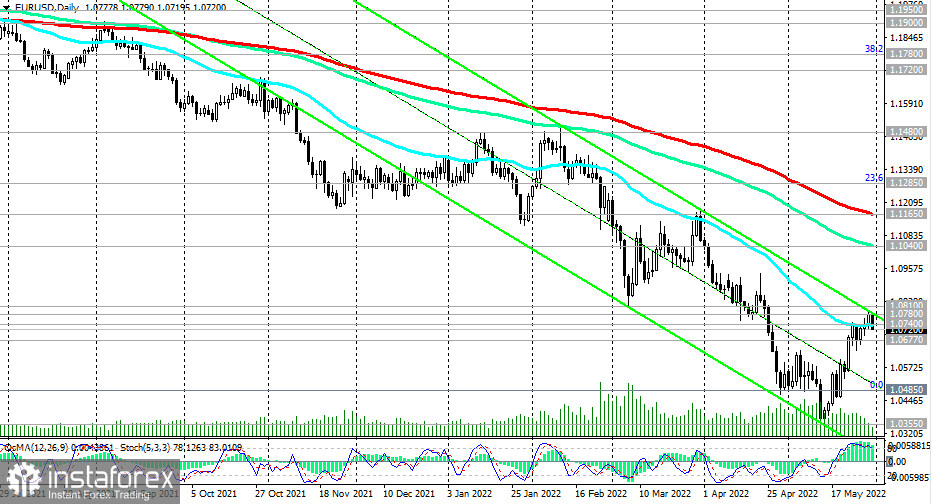During her speech at the World Economic Forum last week in Davos, ECB President Christine Lagarde said that central bank rates are likely to turn positive at the end of the third quarter. In her opinion, the ECB may raise its key interest rate in July (for the first time in 11 years) to reduce the risks of record-high inflation and ease growing concerns about the weakening euro.
"Based on the current outlook, we are likely to be in a position to exit negative interest rates by the end of the third quarter," Lagarde said, also confirming that the asset purchase program (APP) will end at the very beginning of the third quarter, and "if inflation stabilizes at around 2% over the medium term, a gradual further normalization towards a neutral rate would be appropriate. The ECB will take all necessary steps to this end."
The euro rose sharply after Lagarde's statements, which was also supported by positive macro statistics coming in recently from the eurozone. So, last week's Purchasing Managers' Index (PMI) for the manufacturing and services sectors continued to point to strong growth. Despite the relative decline, the Eurozone PMI stands well above the 50 mark separating growth from slowdown in business activity, with the preliminary manufacturing PMI down to 54.4 in May from 55.5 in April, and the services index down to 56. 3 from 57.7.
The weakening of the dollar, which tightened up for the 2nd week in a row, also contributed to the growth of the EUR/USD pair. Yesterday it rose to 1.0786, a 5-week high.
Nevertheless, buyers of the dollar, which have become more active in the market, who, apparently, decided to buy it at attractive levels (after its fall in the previous 2 weeks), contribute to today's strengthening dollar. As of writing this article, futures for the dollar index (DXY) are trading near 101.74, 44 points above yesterday's low.
The dollar has been strengthening since the opening of today's trading day, and the EUR/USD pair, respectively, is declining.
Meanwhile, as follows from the recently published data of the Eurostat agency, the consumer price index (CPI) for the eurozone rose in May by +8.1% (in annual terms), which was higher than the forecast growth of +7.7% and the previous value of +7.4%. The annual core CPI also grew stronger than the forecast and the previous value of +3.5%. Thus, inflation in the eurozone is accelerating, renewing record highs and forcing ECB leaders to speed up decision-making to curb it.
For comparison: annual consumer inflation in the US fell slightly in April (to +8.3% from +8.5% in March). At the same time, the Fed has already begun a cycle of raising the interest rate, and by rather aggressive (for it) methods. For the first time since March 2020, Fed officials at their May meeting decided to raise rates by half a percentage point, the largest increase since 2000 (typically 0.25% interest rate change). Fed officials also announced that a three-month program to reduce the balance sheet, which reached $9 trillion, will begin on June 1 (balance reduction is one of the components of the monetary policy normalization program that the Fed is implementing to slow down inflation). Economists now predict a continuation of the Fed's tough policy and an increase in interest rates by another 50 basis points, to the level of 1.50%. Thus, this cycle of policy tightening will be the fastest in the last 20 years.
Other main and largest central banks of the world (not counting the central banks of Japan and Switzerland) have also begun to tighten their monetary policies. The ECB will likely have to do the same, and very soon. Amid the Russian-Ukrainian military conflict, which triggered a sharp rise in energy and food prices, inflation in Europe has accelerated sharply, with economists expecting it to rise further in the coming months, as energy prices continue to rise, while the European Union imposes new restrictions regarding the Russian economy. The EU's planned refusal to import sea-supplied Russian oil, combined with high inflation and supply chain problems, will trigger a recession in the eurozone, economists say.
It should also be noted that after the publication of CPI indices for the eurozone today (at 09:00 GMT), the euro continued to decline both in the main cross-pairs and against the dollar.
Thus, at the time of writing, EUR/USD is trading near 1.0720, 57 points below the opening price of today's trading day. A break of the 1.0677 support level will open its way deep into the descending channels on the daily and weekly charts and towards the 1.0355 mark.

Today, market participants will pay attention to the publication of a block of important US macro statistics from 13:00 to 14:30 (GMT), and will also follow the meeting between US President Joe Biden and Fed Chairman Jerome Powell, which will also take place around the same time period. During this meeting, measures of the financial authorities to curb inflationary pressure will be considered. The results of the meeting can be positively perceived by investors, which will support the US dollar.
 Tiếng Việt
Tiếng Việt 
 Русский
Русский English
English Bahasa Indonesia
Bahasa Indonesia Bahasa Malay
Bahasa Malay ไทย
ไทย Español
Español Deutsch
Deutsch Български
Български Français
Français 中文
中文 বাংলা
বাংলা हिन्दी
हिन्दी Čeština
Čeština Українська
Українська Română
Română

